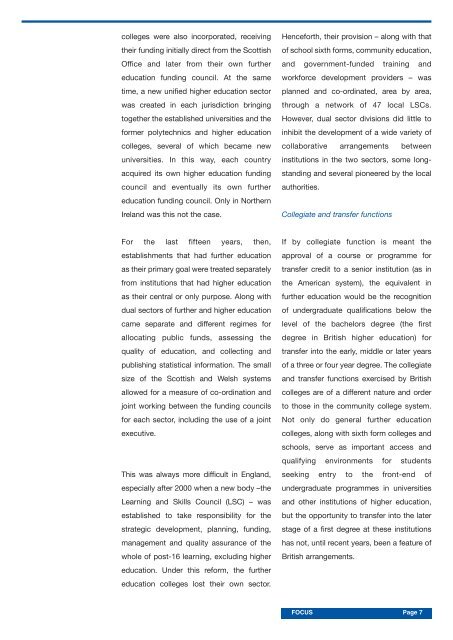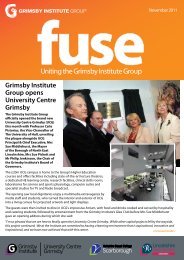Journal of Research & Scholarly Output 2006 - Grimsby Institute of ...
Journal of Research & Scholarly Output 2006 - Grimsby Institute of ...
Journal of Research & Scholarly Output 2006 - Grimsby Institute of ...
You also want an ePaper? Increase the reach of your titles
YUMPU automatically turns print PDFs into web optimized ePapers that Google loves.
colleges were also incorporated, receiving<br />
their funding initially direct from the Scottish<br />
Office and later from their own further<br />
education funding council. At the same<br />
time, a new unified higher education sector<br />
was created in each jurisdiction bringing<br />
together the established universities and the<br />
former polytechnics and higher education<br />
colleges, several <strong>of</strong> which became new<br />
universities. In this way, each country<br />
acquired its own higher education funding<br />
council and eventually its own further<br />
education funding council. Only in Northern<br />
Ireland was this not the case.<br />
Henceforth, their provision – along with that<br />
<strong>of</strong> school sixth forms, community education,<br />
and government-funded training and<br />
workforce development providers – was<br />
planned and co-ordinated, area by area,<br />
through a network <strong>of</strong> 47 local LSCs.<br />
However, dual sector divisions did little to<br />
inhibit the development <strong>of</strong> a wide variety <strong>of</strong><br />
collaborative arrangements between<br />
institutions in the two sectors, some longstanding<br />
and several pioneered by the local<br />
authorities.<br />
Collegiate and transfer functions<br />
For the last fifteen years, then,<br />
establishments that had further education<br />
as their primary goal were treated separately<br />
from institutions that had higher education<br />
as their central or only purpose. Along with<br />
dual sectors <strong>of</strong> further and higher education<br />
came separate and different regimes for<br />
allocating public funds, assessing the<br />
quality <strong>of</strong> education, and collecting and<br />
publishing statistical information. The small<br />
size <strong>of</strong> the Scottish and Welsh systems<br />
allowed for a measure <strong>of</strong> co-ordination and<br />
joint working between the funding councils<br />
for each sector, including the use <strong>of</strong> a joint<br />
executive.<br />
This was always more difficult in England,<br />
especially after 2000 when a new body –the<br />
Learning and Skills Council (LSC) – was<br />
established to take responsibility for the<br />
strategic development, planning, funding,<br />
management and quality assurance <strong>of</strong> the<br />
whole <strong>of</strong> post-16 learning, excluding higher<br />
education. Under this reform, the further<br />
education colleges lost their own sector.<br />
If by collegiate function is meant the<br />
approval <strong>of</strong> a course or programme for<br />
transfer credit to a senior institution (as in<br />
the American system), the equivalent in<br />
further education would be the recognition<br />
<strong>of</strong> undergraduate qualifications below the<br />
level <strong>of</strong> the bachelors degree (the first<br />
degree in British higher education) for<br />
transfer into the early, middle or later years<br />
<strong>of</strong> a three or four year degree. The collegiate<br />
and transfer functions exercised by British<br />
colleges are <strong>of</strong> a different nature and order<br />
to those in the community college system.<br />
Not only do general further education<br />
colleges, along with sixth form colleges and<br />
schools, serve as important access and<br />
qualifying environments for students<br />
seeking entry to the front-end <strong>of</strong><br />
undergraduate programmes in universities<br />
and other institutions <strong>of</strong> higher education,<br />
but the opportunity to transfer into the later<br />
stage <strong>of</strong> a first degree at these institutions<br />
has not, until recent years, been a feature <strong>of</strong><br />
British arrangements.<br />
FOCUS Page 7

















